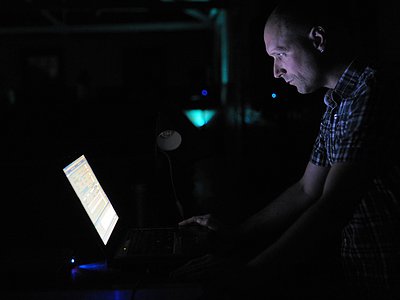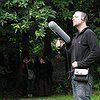Usually, it is considered that it is the job of the composer to win over an audience. But listening is also an active, rather than just a passive process. How do you see the role of the listener in the musical communication process?
The role of the listener is one thing I am constantly considering and working with, especially now in performances. I have even gone as far as to have the audience participate, which engages them much more. For a time I considered a darkened room and to be out of sight enough for audiences to actively listen, but have reconsidered this over the last 7 months as I have performed to such varied audiences, most of whom have not stopped talking, even thinking, and just listened for a long time. It seems like the easiest thing to do, but many people find it difficult.
What, from your point of view, can the sound – rather than, say, its visual appearance - of a particular location or of a particular recording object tell us about its nature? Or, to put it differently, in which way can listening to field recordings change our perception of the world?
The most important thing to notice when the visual side of things is made less important, is that there is no such thing as 'silence'. There is always sound, however quiet, unless you happen to be in an anechoic chamber of course.
The idea of acoustic ecology has drawn a lot of attention to the question of how much we are affected by the sound surrounding us. What's your take on this and on acoustic ecology as a movement in general?
I don't consider what I do as acoustic ecology, but it seems to be raising issues such as sound pollution in town planning and architecture. It would be great if artists working with environmental sound could be consulted in such projects. I’d be happy to work with architects in this way!
In how much, do you feel, are sonic environments shaped by cultural differences – and in how much, vice versa, is the perception of sound influenced by cultural differences?
Sonic environments are always shaped by cultural differences, whether it's small loudspeakers on street vendor's bikes in China or the loudest motorcycles I’ve ever heard in Buenos Aires, Argentina. As for the perception of sound, I think it's interesting that you can travel to almost any country in the world now and there will be a small group of people making abstract music, either using field recordings or improvising with objects and instruments. So the perception of sound as a creative tool is actually a global one, though I would say in some countries it is not a path well travelled, as there is no money to be made in making it. In the western world we almost have the luxury of being able to make music that will never make us a living. Speaking to musicians and artists in Asia and Latin America, it is definitely a harder decision to make, as culturally everything you work in should bring you some income.
The role of an artist is always subject to change. What's your view on the (e.g. political/social/creative) tasks of artists today and how do you try to meet these goals in your work?
I would not enter into an overtly political debate with my work, although some of my projects have been comments or reactions to certain world events. I feel my work is increasingly becoming more involved in social activities and maybe even cultural exchange. Working with and meeting artists in all the countries I am lucky enough to visit, and running active listening and field recording workshops in many places, I feel I am at least helping some people to appreciate the sounds around them more. It's great to show others how to take time out to just stop and listen, and even to approach what they do musically in a slightly different way, as one workshop participant in Argentina told me he does now.
I have realised what I do can be a catalyst for change, and that is something I appreciate and will continue to work with.
Music-sharing sites and -blogs as well as a flood of releases in general are presenting both listeners and artists with challenging questions. What's your view on the value of music today?
Generally, with file-sharing, with numerous net-labels, with Bandcamp, Soundcloud, etc. the value of the physical means of buying music has diminished greatly. However, I will continue releasing work in physical formats because it's good to have something to give to other artists, event organisers, and even to sell at concerts. I always appreciate being given physical releases and will generally buy at concerts if I have enjoyed a performance, and I know I am not alone in this.
Please recommend two artists to our readers which you feel deserve their attention.
Two is not really enough but one artist I have a lot of time and respect for is John Grzinich
The second is Jonathan Coleclough
Performing and spending time with both of them has allowed me to explore other ways of making and performing music. My apologies for all the other artists I have been unable to mention!
Read and hear more Simon Whetham at www.simonwhetham.co.uk



